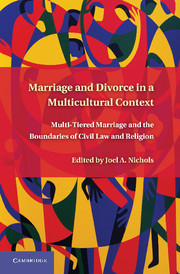 Marriage and Divorce in a Multi-Cultural Context
Marriage and Divorce in a Multi-Cultural Context An Afterword
Published online by Cambridge University Press: 05 November 2011
Introduction
Anglican Archbishop Rowan Williams set off an international firestorm on February 7, 2008, by suggesting that some “accommodation” of Muslim family law was “unavoidable” in England. His speech itself was nuanced and qualified, carefully discussing the “growing challenge” of “the presence of communities which, while no less ‘law-abiding’ than the rest of the population, relate to something other than the British legal system alone.” Nonetheless, his public reflection on “what degree of accommodation the law of the land can and should give to minority communities with their own strongly entrenched legal and moral codes” gave rise to more than 250 articles in the world press within a month – with the vast majority denouncing his remarks. England, his critics charged, will be beset by “licensed polygamy,” barbaric procedures, and brutal violence against women encased in suffocating burkas if official sanction is given to shari’a courts. Despite the fact that religious citizens already turn to informal religious adjudication of family law and other disputes, critics proclaimed that giving legal sanction to such adjudications would create unequal citizenship and foster enclaves of legally ghettoized Muslim courts immune from civil appeal or constitutional challenge. Other critics pointed to Nigeria, Pakistan, and other former English colonies that have sought to balance shari’a with the common law. The horrific excesses and chronic human rights violations of their religious courts – even ordering the faithful to stone innocent rape victims for dishonoring their families – prove that religious laws and state laws on the family simply cannot coexist, they said. Case closed.
This case won’t stay closed for long, however. The Archbishop was not calling for the establishment of a parallel system of independent Muslim courts in England, and certainly not the direct enforcement of shari’a by English civil courts. He was, instead, raising a whole series of hard but “unavoidable” questions about marital, cultural, and religious identity and practice in Western democratic societies committed to human rights for all. What forms of marriage should citizens be able to choose, and what forums of religious marriage law should state governments be required to respect? How should Muslims and other religious groups with distinctive family norms and cultural practices that vary from those espoused by the liberal state be accommodated in a society dedicated to religious liberty and equality, to self-determination and nondiscrimination? Are legal pluralism and even “personal federalism” necessary to protect Muslims and other religious believers who are conscientiously opposed to the liberal values that inform modern state laws on sex, marriage, and family? Or must there instead be “legal universalism” with its attendant “exclusionary consequences”? Are these really the only options – or instead is something more akin to a “dance” between religious and civil law more appropriate and necessary?
To save this book to your Kindle, first ensure no-reply@cambridge.org is added to your Approved Personal Document E-mail List under your Personal Document Settings on the Manage Your Content and Devices page of your Amazon account. Then enter the ‘name’ part of your Kindle email address below. Find out more about saving to your Kindle.
Note you can select to save to either the @free.kindle.com or @kindle.com variations. ‘@free.kindle.com’ emails are free but can only be saved to your device when it is connected to wi-fi. ‘@kindle.com’ emails can be delivered even when you are not connected to wi-fi, but note that service fees apply.
Find out more about the Kindle Personal Document Service.
To save content items to your account, please confirm that you agree to abide by our usage policies. If this is the first time you use this feature, you will be asked to authorise Cambridge Core to connect with your account. Find out more about saving content to Dropbox.
To save content items to your account, please confirm that you agree to abide by our usage policies. If this is the first time you use this feature, you will be asked to authorise Cambridge Core to connect with your account. Find out more about saving content to Google Drive.